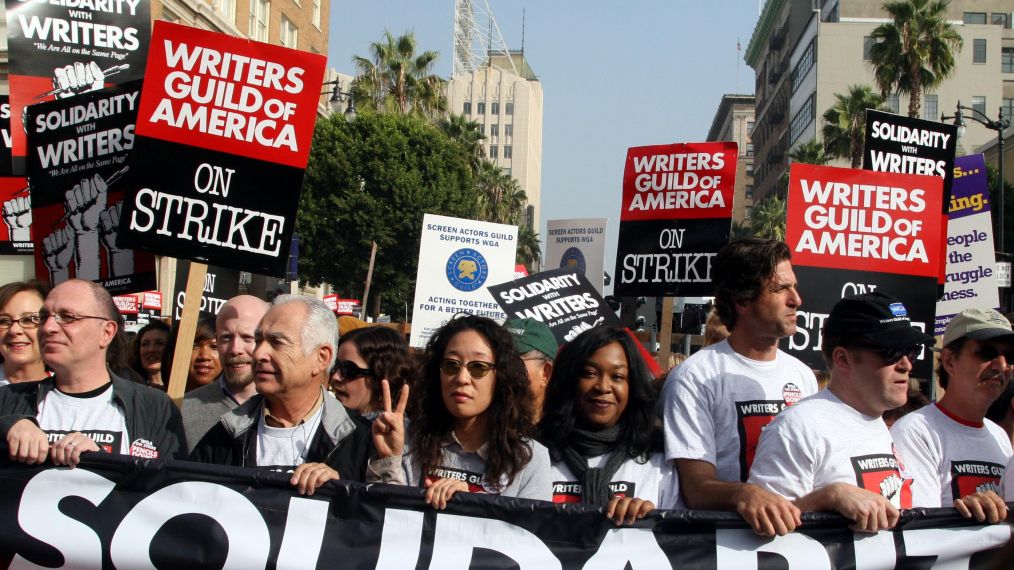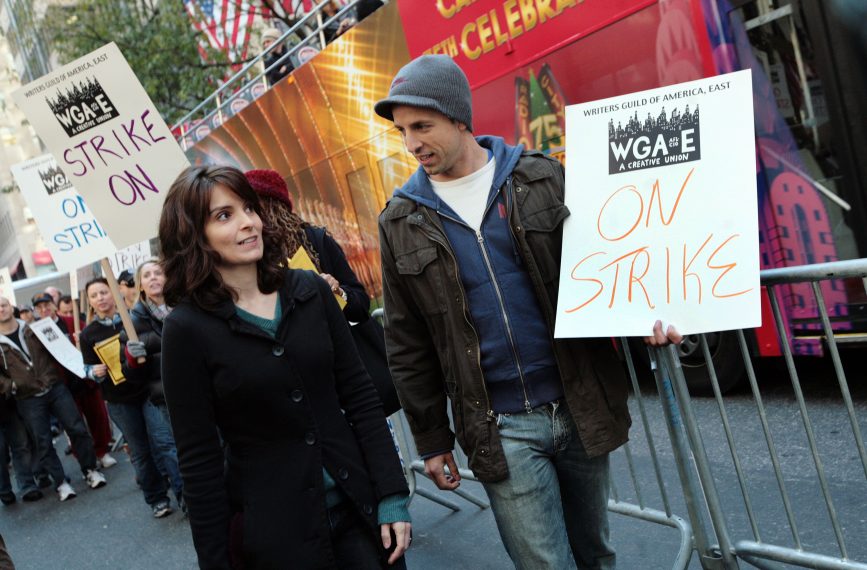Will TV Go Dark This Summer? What the Potential Writers’ Strike Means for Viewers

TV fans will likely remember the disruption of the 2007–2008 writers’ strike. Production ground to a halt for 100 days after the Writers Guild of America and the Alliance of Motion Picture and Television Producers couldn’t come to an agreement on the writers’ contract. Popular shows in primetime and late night didn’t air new episodes for months. Now, with the writers’ contract up for renewal again, history could repeat itself.
Negotiations between the WGA and the AMPTP were set to resume April 25 after stalling on April 17. It was the second time since formal negotiations began in March that the two organizations pumped the brakes—but this time when they return to the negotiating table, the WGA will have a major bargaining chip. On Monday, the guild voted overwhelmingly to authorize a strike if they can’t reach a deal by May 1, when their current contract expires. Both sides, however, seem committed to reaching a deal that will keep the industry working. (Variety and Deadline have both reported that there may also be an effort to extend the current contract deadline to give both sides more time to come to an agreement.)
What the writers are fighting for
While the past decade of “peak TV” has been great creatively—resulting in some of the most innovative and influential shows in TV history—it has been hard on writers, according to the guild. As networks move toward shorter seasons, writers are paid for fewer scripts, and their contracts and production schedules prevent them from taking jobs on additional shows. Prestige dramas and auteur comedies may have top-shelf sheen, but the cable and streaming outlets on which they air typically pay significantly less per script than broadcast networks.
At the same time, increased digital and international distribution has led to soaring profits for the entertainment industry, according to analysts. With streaming services continuing to pay licensing fees on content to build their libraries, the WGA expects those profits to continue to grow—and they want a piece of the pie.
Also at play is the guild’s healthcare package. The plan has been operating at a deficit and could become insolvent, guild writer Amy Berg explains on Medium.com. That’s partly a result of rising healthcare costs, but “mostly it’s because writers aren’t making as much as they used to, which means employer contributions to our health and pension plans are way down,” Berg writes.

How will the strike impact what’s on TV?
With most scripted shows on hiatus during the summer, broadcast networks pack their schedules with unscripted reality series. These shows are covered under a different contract and won’t be affected by a strike. A Fox insider says there are no changes planned for the network’s schedule, which is dominated in the coming months by reality shows like MasterChef, So You Think You Can Dance and American Grit.
Reps at CBS and NBC declined to comment, but their reality slate, including Big Brother and America’s Got Talent, should be fine. And it’s a safe bet that some scripted series, like ABC’s Still Star-Crossed, a sequel to Romeo and Juliet from producer Shonda Rhimes, are already in the can. A source at HBO says the new season of Game of Thrones, possibly the summer’s most anticipated return (it’s back July 16), won’t be affected. AMC declined to comment on the status of summer dramas like Fear the Walking Dead and Preacher.
Late-night talk shows, which rely on writers for jokes and monologues, will almost certainly be forced to take a break. The same could be true for daytime dramas, unless producers bring in other writers, as they did in 2007–2008. But the biggest consequence of a strike may not be felt until fall. New and returning scripted series that premiere in September and October typically resume production in mid-summer and would likely be delayed.
One area of the industry that could benefit from a strike: streaming sites. With network shows on pause, viewers could turn to Netflix, Amazon, Hulu and others to catch up on shows and revisit older series and films. But even streaming isn’t immune. During a discussion with industry analysts in mid-April, Netflix’s chief content officer, Ted Sarandos, confirmed that “some of our productions would be held up in the event of a strike.”
For now, Hollywood, like television viewers, remains in suspense.









